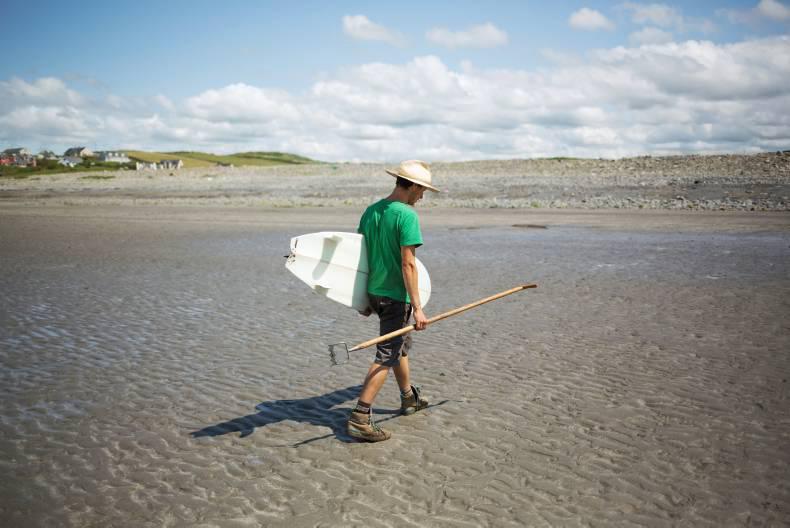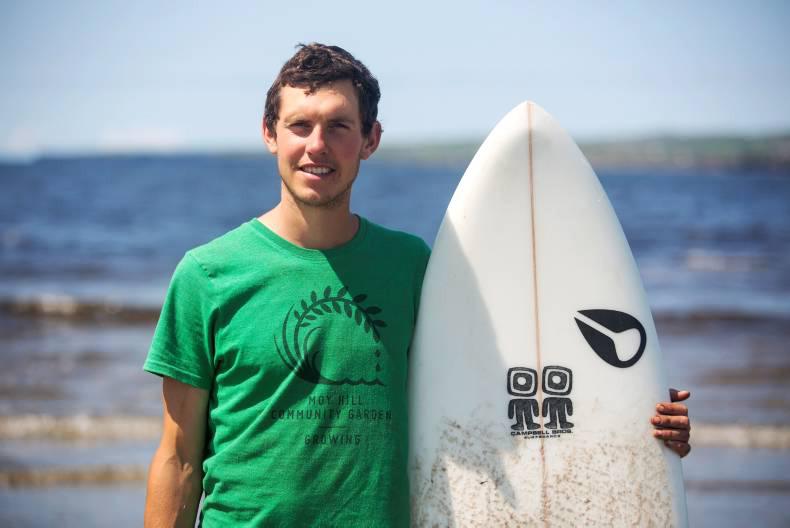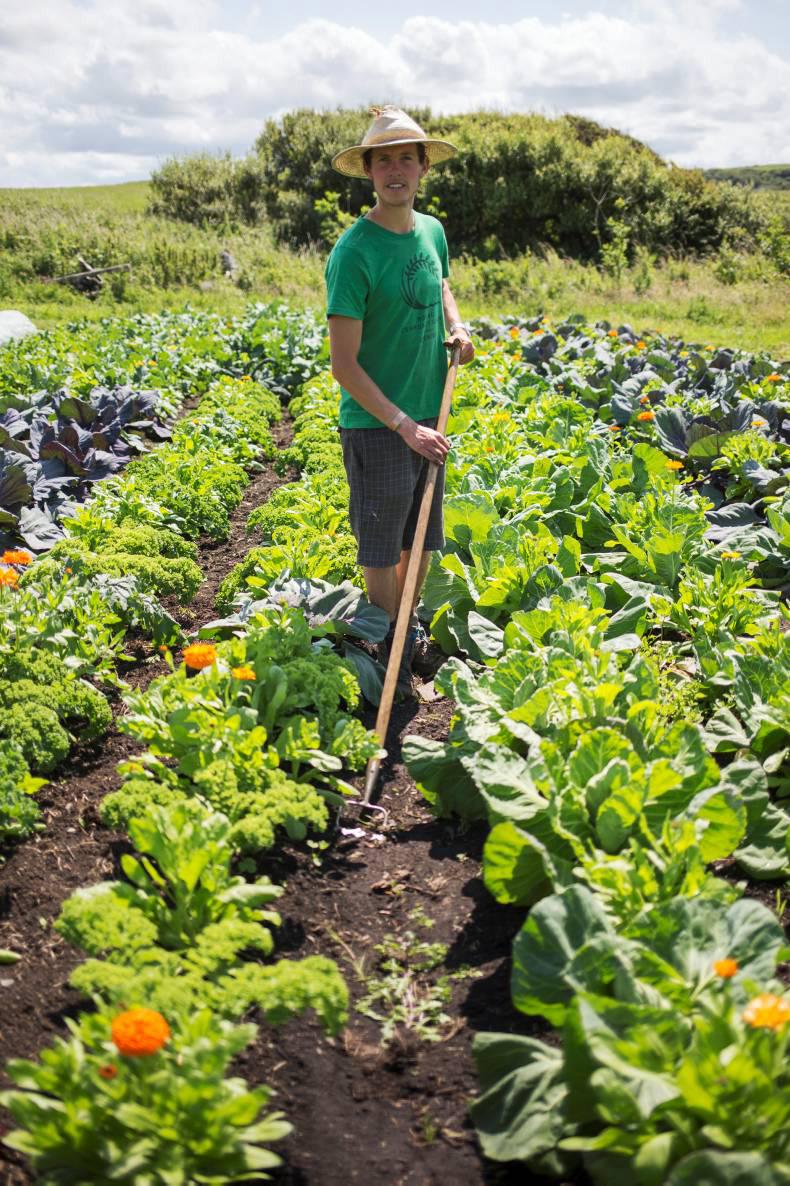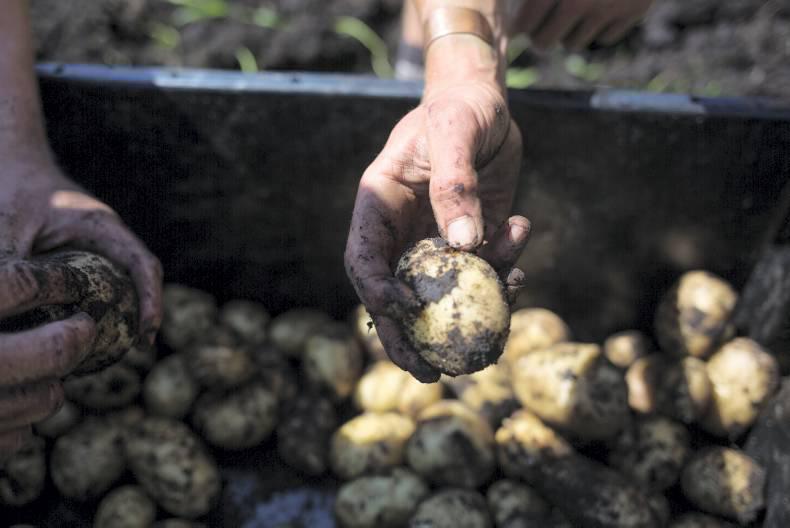Given that Country Living spent its childhood being dragged around the blustery coastline of Ireland (think water sports in the rain while the cousins were in Malta), we feel confident in our knowledge of Ireland’s beaches, and it’s hard to beat Lahinch, Co Clare – even if it’s wild. But its wild waves are its selling point and why every signpost on the way into the town is labelled with “#surfcity”.
Lahinch is where Fergal Smith – Ireland’s most successful professional surfer – calls home.
When a CAO form was handed to Fergal in sixth year, his response was: “Why are you giving me one of those? I don’t need that.”
Cue Fergal being hauled down to the principal’s office, but even the principal couldn’t argue with Fergal’s passion for surfing.
“If someone told me that running up and down a mountain five times would make me a better surfer, I would have done it,” he explains.
In fact, it was a feat that Fergal was still in school by sixth year at all. When he was in transition year, he didn’t go to school; instead, he spent his time travelling all over the country with his brother, seeking out the best places to surf.
Fergal’s parents had to give him an ultimatum: if he went back to school, they would buy him a car, meaning he could surf before and after school; or he could start working.
Fergal went to bed early, he didn’t go to clubs or pubs, he got up a 6am every morning and trained five days a week. Not surprisingly, this dedication saw him ultimately surf for Ireland. An hour after he finished his final Leaving Cert exam, he was on a train to Dublin, with Brisbane in Australia his intended destination. He then spent a lot of the next six years being sponsored to travel all over the world, surfing.
From Surfing to spuds
These days Fergal, who is now 27, is back on Irish soil full-time and has turned his attention to organic farming. He has a one-acre vegetable garden which is owned by the Moy House guesthouse just outside Lahinch where he grows 20 varieties of potatoes as well as beans, spinach, beetroot, leeks, onions, garlic, carrots, kohlrabi, parsnips, celery, celeriac and squash – to name but a few.
However, Fergal is not growing vegetables simply to sell them. Rather, he has a vision that this plot will become a community-owned allotment, where people won’t have to commit to the hard graft of gardening. Community supported agriculture (CSA) farms are his model, where consumers buy local, seasonal produce directly from a farmer.
His plan is that a membership fee will be paid and members can come and take as much veg as they want (within reason). They are also invited to do a few hours’ work on the farm. They might call in once a week, or once a month.
“You can be as much or as little involved as you like,” explains Fergal, who does call-outs on social media when big jobs need to be done, requesting help on a particular day.
“It’s the Meitheal idea – getting everybody in for the big day, just like farming used to be,” he explains.
This then gives Fergal more time to surf. The idea of the membership is that it will pay the wages of Fergal and one other person to manage the farm. This is the second summer Fergal has had the vegetable garden up and running but he is not charging membership yet because he wants people properly committed to the concept first. Instead, he is selling the vegetables in a box scheme (€10 for a small box and €20 for a big box) to those who appreciate the concept, and at local farmers’ markets .
This is all in stark contrast to the operation run by his dad back in Mayo, where Fergal is from – an organic farm with cash crops in tunnels rather than field crops. Fergal saw how hard it was for his dad to get time off and this is why Fergal got to spend so many weekends during his childhood surfing in Achill – his family couldn’t get away for an entire week. This is also where Fergal acquired his expertise.
“Everyone wants to learn but no-one knows how to do it,” says Fergal.
“We’re becoming too detached from food. The last generation left farming very quickly. I’ve a duty to teach my friends. My friend Mitch was a bacon-butty, white-bread-sandwich kind of a man. But now I’m going away for 10 days and he’s going to look after it,” says Fergal.
And there are plans for expansion. Five couples (friends of Fergal and his wife, Sally) have come together to buy 17 acres of land up the road where they are going to relocate and build a bigger garden.
Healthy lifestyle
Fergal’s interest in growing healthy food is partly attributable to his background as a professional athlete. According to the Irish Surf Association, Fergal is the only Irish surfer who has made a full livelihood out of surfing professionally.
He was sponsored to chase waves all over the world and was often to be found surfing in the southern hemisphere in winter, as the best waves occur during storms.
It was all about where the next big swell was and, for the good swells, photographers and videographers were on standby to document Fergal’s progress and then secure coverage in the surfing media to keep Fergal’s sponsors happy.
Three years ago, at the age of 24, he started slowing down and doesn’t travel at all now. He says there’s “a million reasons” why he stopped travelling.
“I want to go catch more waves – it didn’t sit well with me, getting paid to go on holidays. For how long can you live your dream? What’s enough? What’s the quota to say you lived the dream?
“I once did 18 flights in two and a half months. That style of lifestyle is consumerism and selfishness. What does a surfer give back to the planet?”
Fergal now doesn’t fly as he feels guilty about the carbon footprint; if he does have to take a plane, he’ll make a donation to three charities first.
“Ireland’s the place I want to be. I’m from Ireland, I love the waves here, I love the people and the community. I think I really craved community. I could never commit to anything – to Christmas dinner or to my mother’s birthday. You’re not an asset to anyone.”
Not only does Fergal now have a community but he also has a family: wife, Sally, and eight-month-old daughter, Sunshine.
And while making waves on the professional surfing scene is no longer his priority, we’re sure the path he paves in organic gardening will yield just as many results.
Lahinch: the surfing capital of Ireland
Surfer Mitch Corbett moved to Lahinch from Cornwall in England because of the waves but has found so much more in the Co Clare town.
“The locals are hospitable and welcoming,” he says. “It’s a very attractive place. There is a very big bunch of like-minded people. Lots of people come and don’t leave – it’s a really good vibe.”
So this is what the surfers think about Lahinch but what does Lahinch think about the surfers?
Kenny’s
Kenneth Kenny, a fourth generation publican in the town, has only good things to say about what surfing has done for Lahinch.
“It didn’t just happen – it’s going back a long time. The first meeting of the West Coast Surf Club was in Kenny’s, my pub,” says Kenneth.
He recounts the history of surfing in the town.
“The first prize surf competition in the west of Ireland was in 1971 and was run by the West Coast Surf Club. In the ’70s, five guys would be sharing one surf board – they didn’t have the materials – but in the ’80s more people had money for buying boards and more people started surfing. But between the ’80s and ’90s the sport fell back in popularity. Then John McCarthy and others arrived to surf waves here and the popularity grew. Locals started getting back into it and boards started becoming more readily available.”
Kenneth says that the surfing schools in Lahinch played a big role in making the sport popular again in the town, and that “all the rest of the schools” and “everyone in Lahinch” can thank John McCarthy for pioneering this effort by setting up the first surf school in the town.
While golf is longer established in Lahinch (the golf club was founded in 1896 and Lahinch has one of the top 40 golf courses in the world), “the waves were always coming in there”, notes Kenneth.
“Surfing is a massive addition to the town, and it’s not just tourists coming. We’ve a surfing community here – about 200 people working and surfing. It’s brought a lot of people to the area and a lot of these people are very educated. Their whole life is based around surfing.
“They’re very health-conscious. It’s also not a male-dominated sport. Our head barman Stef is from Cornwall and he’s an amazing surfer. Surfing is massive for Lahinch. It’s complementary to everything we were about originally and will be in the future,” says Kenneth.
Lahinch Surf School
John McCarthy set up Lahinch Surf School in 2002. While there were surfing lessons available in Lahinch, this was the first full-time surf school. John grew up surfing in his hometown of Tramore, Co Waterford, where there were three surf schools.
“I came here in 2001 and there was no surf school here and I thought well this is the beach for surfing in Ireland.”
John starting surfing at the age of 10 and then went on to surf for Ireland, so he was the perfect person to set up a school in Lahinch.
Does he take much credit for helping make Lahinch a go-to destination for surfing?
“For us in Tramore, Lahinch was the place to come for surfing. But it was just the right time and the right place and the surf school has definitely helped Lahinch along.”
There are now five surf schools in Lahinch.
“It’s a very competitive market and then there’s the weather. It’s a labour of love; it’s like farmers, they just enjoy doing it so it is a labour of love. I think surfing has made a big difference [to Lahinch] ... Surfing is up there with golf probably for bringing people to Lahinch and we get stag parties and hen parties at weekends and we get people doing surf courses and we get kids doing surf camps. Previously there were probably 30 people employed here; it’s probably down to about 15 or 18 now and that’s in high season in summer.”






 This is a subscriber-only article
This is a subscriber-only article












SHARING OPTIONS: